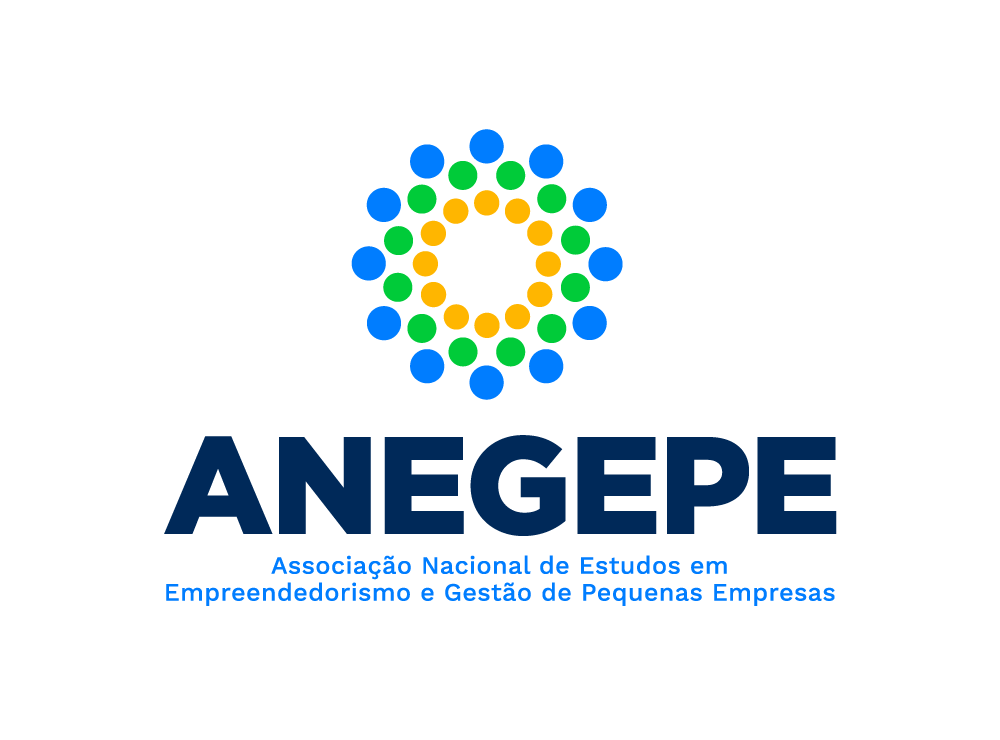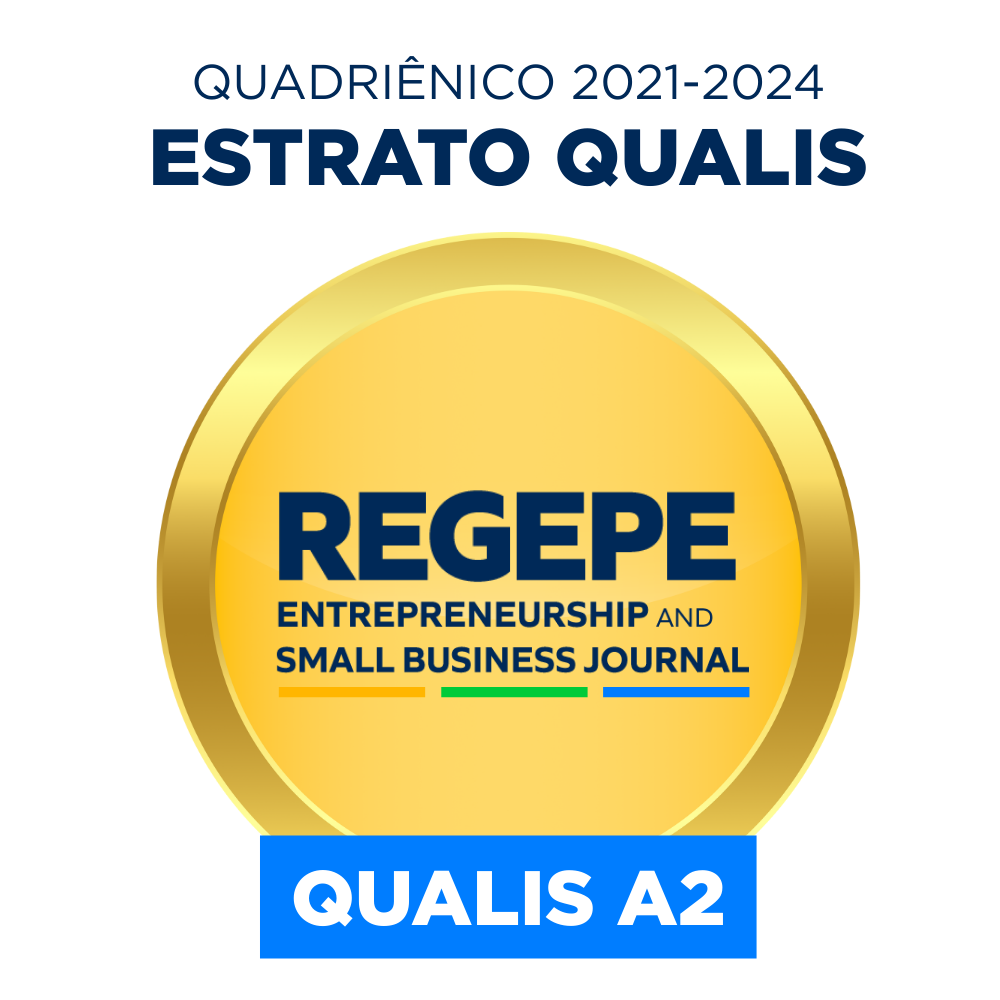Un análisis de la producción científica internacional sobre aceleradores empresariales de 1990 a 2019
DOI:
10.14211/ibjesb.e2072Palabras clave:
Aceleradores de empresas, Aceleradores, Revisión sistemática, Reorganización de campoResumen
Objetivo: El objetivo de este trabajo es desarrollar un panorama de las publicaciones científicas sobre “Aceleradores de Negocios”, mapeando los aportes académicos ya realizados, organizándolos y sistematizándolos para mostrar el estado del arte del fenómeno de aceleración de startups. Método: El método es cualitativo con una revisión sistemática de la literatura, de tipo descriptivo. Los datos se recopilaron en las bases de datos Scopus y Web of Science, entre 1990 y 2019. La extracción de datos aportó una muestra de 403 artículos que, tras aplicar criterios de exclusión, se consolidaron en 95 artículos. Originalidad / Relevancia: Considerando la amplia difusión de los aceleradores empresariales en el mundo, la sistematización de la literatura permitió presentar los pilares de apoyo de los aceleradores, lo que permite un avance en el estudio del tema y facilita la base para la realización de investigaciones futuras que también puedan Utilice las sugerencias de la investigación realizada. Resultados (obligatorio): Los resultados muestran los procesos de aceleración, consolidados en un modelo de aceleración estructural que se sustenta en cuatro pilares descompuestos en ocho procesos trabajados por las organizaciones, derivados de las definiciones de la literatura. Contribuciones teóricas / metodológicas: El principal aporte teórico es la presentación del modelo de aceleración estructural, seguido del panorama de publicaciones internacionales en el área y la identificación de nuevas oportunidades de investigación futura en el área de emprendimiento e innovación.
Clasificación JEL: A19, O00, O30, O31, O33, O36
Descargas
Citas
Bliemel, M., Flores, R., De Klerk, S., & Miles, M. P. (2019). Accelerators as start-up infrastructure for entrepreneurial clusters. Entrepreneurship & Regional Development, 31(1/2), 133-149. https://doi.org/10.1080/08985626.2018.1537152
Carayannis, E. G., & Von Zedtwitz, M. (2005). Architecting gloCal (global-local), real-virtual incubator networks (G-RVINs) as catalysts and accelerators of entrepreneurship in transitioning and developing economies: lessons learned and best practices from current development and business incubation practices. Technovation, 25(2), 95-110. https://doi.org/10.1016/S0166-4972(03)00072-5
Clayton, P., Feldman, M., & Lowe, N. (2018). Behind the scenes: Intermediary organizations that facilitate science commercialization through entrepreneurship. Academy of Management Perspectives, 32(1), 104-124. https://doi.org/10.5465/amp.2016.0133
Cohen, S., Fehder, D. C., Hochberg, Y. V., & Murray, F. (2019). The design of startup accelerators. Research Policy, 48(7), 1781-1797. https://doi.org/10.5465/amp.2016.0133
Crișan, E. L., Salanță, I. I., Beleiu, I. N., Bordean, O. N., & Bunduchi, R. (2021). A systematic literature review on accelerators. The Journal of Technology Transfer, 46, 62-89. https://doi.org/10.1007/s10961-019-09754-9
Felizardo, K. R., Salleh, N., Martins, R. M., Mendes, E., MacDonell, S. G., & Maldonado, J. C. (2011). Using visual text mining to support the study selection activity in systematic literature reviews. In 2011 International Symposium on Empirical Software Engineering and Measurement, 77-86. https://doi.org/10.1109/ESEM.2011.16
Friese, S. (2019). Qualitative data analysis with Atlas.ti. Sage Publications Limited.
Gonzalez-Uribe, J., & Leatherbee, M. (2018). The effects of business accelerators on venture performance: Evidence from start-up Chile. The Review of Financial Studies, 31(4), 1566-1603. https://doi.org/10.1093/rfs/hhx103
Goswami, K., Mitchell, J. R., & Bhagavatula, S. (2018). Accelerator expertise: Understanding the intermediary role of accelerators in the development of the Bangalore entrepreneurial ecosystem. Strategic Entrepreneurship Journal, 12(1), 117-150. https://doi.org/10.1002/sej.1281
Hasan, S., & Koning, R. (2019). Prior ties and the limits of peer effects on startup team performance. Strategic Management Journal, 40(9), 1394-1416. https://doi.org/10.1002/smj.3032
Kauppi, K., Salmi, A., & You, W. (2018). Sourcing from Africa: a systematic review and a research agenda. International Journal of Management Reviews, 20(2), 627-650. https://doi.org/10.1111/ijmr.12158
Knopf, J. W. (2006). Doing a literature review. PS: Political Science & Politics, 39(1), 127-132. Recuperado de https://www.jstor.org/stable/20451692
Kreusel, N., Roth, N., & Brem, A. (2018). European business venturing in times of digitisation-an analysis of for-profit business incubators in a triple helix context. International Journal of Technology Management, 76(1-2), 104-136. https://doi.org/10.1504/IJTM.2018.088707
Le, T. (2021). The impacts of online transition due to Covid-19 on the startup accelerator experience of the participants (Bachelor thesis). Programme in International Business, South-Eastern Finland University of Applied Sciences, Finland. Recuperado de https://www.theseus.fi/bitstream/handle/10024/502437/Theseus_Le_Trang.pdf?sequence=2&isAllowed=y
Letaifa, S. B., & Rabeau, Y. (2013). Too close to collaborate? How geographic proximity could impede entrepreneurship and innovation. Journal of Business Research, 66(10), 2071-2078. https://doi.org/10.1016/j.jbusres.2013.02.033
Malheiros, V., Hohn, E., Pinho, R., Mendonca, M., & Maldonado, J. C. (2007, September). A visual text mining approach for systematic reviews. In First International Symposium on Empirical Software Engineering and Measurement (pp. 245-254). IEEE. https://doi.org/10.1109/ESEM.2007.21
Mansoori, Y., Karlsson, T., & Lundqvist, M. (2019). The influence of the lean startup methodology on entrepreneur-coach relationships in the context of a startup accelerator. Technovation, 84, 37-47. https://doi.org/10.1016/j.technovation.2019.03.001
Metcalf, L. E., Katona, T. M., & York, J. L. (2020). University Startup Accelerators: Startup Launchpads or Vehicles for Entrepreneurial Learning? Entrepreneurship Education and Pedagogy, 2515127420931753. https://doi.org/10.1177/2515127420931753
Mian, S., Lamine, W., & Fayolle, A. (2016). Technology Business Incubation: An overview of the state of knowledge. Technovation, 50, 1-12. https://doi.org/10.1016/j.technovation.2016.02.005
Mtigwe, B. (2005). The entrepreneurial firm internationalization process in the Southern African context: A comparative approach. International Journal of Entrepreneurial Behavior & Research, 11(5), 358-377. https://doi.org/10.1108/13552550510615006
Ozkazanc‐Pan, B., & Clark Muntean, S. (2018). Networking towards (in) equality: Women entrepreneurs in technology. Gender, Work & Organization, 25(4), 379-400. https://doi.org/10.1111/gwao.12225
Pandey, S., Lall, S., Pandey, S. K., & Ahlawat, S. (2017). The appeal of social accelerators: What do social entrepreneurs value? Journal of Social Entrepreneurship, 8(1), 88-109. https://doi.org/10.1080/19420676.2017.1299035
Paré, G., Trudel, M. C., Jaana, M., & Kitsiou, S. (2015). Synthesizing information systems knowledge: A typology of literature reviews. Information & Management, 52(2), 183-199. https://doi.org/10.1016/j.im.2014.08.008
Pauwels, C., Clarysse, B., Wright, M., & Van Hove, J. (2016). Understanding a new generation incubation model: The accelerator. Technovation, 50, 13-24. https://doi.org/10.1016/j.technovation.2015.09.003
Rossetto, B. A., Carvalho, F. C., Bernardes, R., & Borini, F. (2017). Absorptive Capacity and Innovation: An Overview of International Scientific Production of Last Twenty-Five Years. International Journal of Innovation, 5(1), 97-113. Recuperado de https://ssrn.com/abstract=2978188
Rubin, T. H., Aas, T. H., & Stead, A. (2015). Knowledge flow in technological business incubators: evidence from Australia and Israel. Technovation, 41, 11-24. https://doi.org/10.1016/j.technovation.2015.03.002
Teare, G. (2021). Growth Firms, Not VCs, Are The Most Active Investors In New Unicorns This Year, And They’re Doubling Down. Crunchbase News, Venture. Recuperado de https://news.crunchbase.com/news/growth-firms-the-most-active-investors-doubling-down-on-new-unicorns-this-year/.
Van Huijgevoort, T. (2012). The ‘business accelerator’: Just a different name for a business incubator (Bachelor Thesis). Utrecht School of Economics, Utrecht, The Netherlands.
Van Stijn, N., Van Rijnsoever, F. J., & Van Veelen, M. (2018). Exploring the motives and practices of university-start-up interaction: evidence from Route 128. The Journal of Technology Transfer, 43(3), 674-713. https://doi.org/10.1007/s10961-017-9625-5
Wiggins, J., & Gibson, D. V. (2003). Overview of US incubators and the case of the Austin Technology Incubator. International Journal of Entrepreneurship & Innovation Management, 3(1/2), 56-66. https://doi.org/10.1504/IJEIM.2003.002218
Wright, M., Siegel, D. S., & Mustar, P. (2017). An emerging ecosystem for student start-ups. The Journal of Technology Transfer, 42(4), 909-922. https://doi.org/10.1007/s10961-017-9558-z
Descargas
Publicado
Métricas
Visualizações do artigo: 2159 PDF (Português (Brasil)) downloads: 263 PDF (English) downloads: 192
Cómo citar
Número
Sección
Licencia
Derechos de autor 2021 Matheus Eurico Soares de Noronha, Cristina Doritta Brandão Majorana, Leonardo Reis Longo, Ilan Avrichir

Esta obra está bajo una licencia internacional Creative Commons Atribución 4.0.
Los autores que publican en esta revista están de acuerdo con los siguientes términos:
-
El/La autor(a)/es(as) autorizan la publicación del texto en la revista;
-
La revista no se responsabiliza de las opiniones, ideas y conceptos emitidos en los textos, ya que son de entera responsabilidad de sus autores/autoras;
-
Los autores/autoras mantienen los derechos de autor y conceden a la revista el derecho de la primera publicación, con el trabajo publicado bajo la Licencia CC BY 4.0
, que permite el compartir el trabajo con reconocimiento de la autoría y la publicación inicial en esta revista;
-
Los autores/autoras están permitidos y animados a publicar su trabajo (Versión enviada, Versión aceptada [Manuscrito aceptado por el autor/autora] o Versión publicada [Versión del registro]) en línea, por ejemplo, en repositorios institucionales o preprints, ya que puede llevar a intercambios productivos, así como a citas anteriores y mayores de trabajos publicados. REGEPE pide como condición política para los autores/autoras que indiquen/vinculen el artículo publicado con DOI. Vea el Efecto del Acceso Abierto.
















